
THE VOICE OF INTERNATIONAL LITHUANIA
|
VilNews has its own Google archive! Type a word in the above search box to find any article.
You can also follow us on Facebook. We have two different pages. Click to open and join.
|
Archive for March, 2012
- Posted by - (0) Comment
TODAY’S COMMENT:

Evaldas Zvinys
“There are significant cultural differences
between LT-Americans and Lithuanians
that grew up in the Soviet Lithuania”
Just a couple of short notes to your article
“Healing the wounds between LT-Americans and the homeland”
Item 2. There are significant cultural differences between LT-Americans and Lithuanians that grew up in the Soviet Lithuania. In my opinion there is not enough appreciation of the lifetime dedication and work of some of the people outside of Lithuania. In my opinion press likes to focus on negative experiences (e.g. events with LT-Australian Petraitis) while ignoring genuine contributions to Lithuania. My own Alma Mater - Vytautas Magnus University is there in big part because of Lithuanians who grew up outside of Lithuania. IMHO Grybauskaite's comments of course miss the point and are rude.
Item 5. <"...ending the noxious practice of the Uzgavenes holiday when people dress as Jews and beg on the street.” > In my life I have not seen a person dressed up as a Jew and begging on the street. I would be really surprised if I would see this. On the other hand, during the Uzgavenes people go from house to house and ask for pancakes, coffee or money (similar to Halloween tradition in the US?). I guess the idea was that the person who knocks on the door is not known - and you share what you have with a stranger (the stranger could be a Jew, Roma, or a generic stranger). Is that offensive and should be eradicated? In the Soviet times I've heard the following chant in my Samogitian hometown Telsiai "mes Zydukai is Maskvos (Rygos), duokit blynu ir kavos" - "we are the Jews from Moscow (Riga), please give us pancakes and coffee" - not sure why Moscow/Riga is there, perhaps to indicate that the person came from afar? I am not certain how it was during the Interbellum - but as I said - in my opinion the old traditions are going away - be it good, bad or indifferent.
Evaldas Zvinys
http://tautietis.blogspot.com/
- Bookmark :
- Digg
- del.icio.us
- Stumbleupon
- Redit it
- Posted by - (9) Comment
A native American who loves Lithuania!

It is the 30th of March today. It is exactly 22 years since American Marie Sandler (pictured) married Lithuanian Jonas. He passed away in 1996, but Marie was already completely in love with Lithuania. It's a love she maintains to this day. Below you can read her love letter to her deceased husband's home country.
Dear Lithuania,
Ever since I got connected to you, my love for the culture and people of Lithuania has been on a daily increase.
I was born into a Christian family in Urbandale Iowa in United States and grew up as a normal American girl with good parental upbringing. One day, I met a man and for the first time hearing about a country called Lithuania.
I fell in love with this man, followed him to his home country to see and learn the beautiful culture of Lithuania. After some time my love for the man became wider, something more than an ordinary feeling – and I soon felt I became part of a hidden history of a country that once was the symbol of Europe, with an extremely well developed diplomacy and intelligent wisdom long before today's famous European nations came to such ideas. Through recognizing this small Baltic country, I felt that the background of my new love also got me into an older knowledge, something hard to define, but something that still today represents the mystery of Lithuania, a country like no other country.
I married him, but to a certain degree also Lithuania, the soil of ancient wisdom...
I, as an American, got into something I still today cannot fully explain. When he passed away, I could have forgotten Lithuania, but I didn't because his soul, and his country's soul still bells in my ears.
The smell of the Lithuanian soil makes me cry and smile and then I look up to the sky and realized that home is truly where the mind is.
Lithuania is a home. I love Lithuania.
Marie Sandler
Director, Bulldogs Petroleum Corporation (BPC)
Email: mariesandler@bulldogspetroleum.com
www.bulldogspetroleum.com
- Bookmark :
- Digg
- del.icio.us
- Stumbleupon
- Redit it
- Posted by - (0) Comment
Sunday 1 April is
Verbų sekmadienis
– Palm Sunday
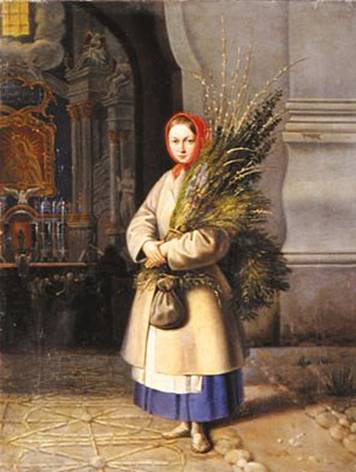
Kanutas Ruseckas (1800–1860).
Lietuvaitė su verbomis (1847)
The Christian world celebrates Jesus' noble entry into Jerusalem on the last Sunday before Easter. In Lithuania this day is called Verbu Sekmadienis – Palm Sunday. When Christianity came to Lithuania, plants which sprouted earliest were honored during spring feasts. Even now, willows, osiers and weeping willows are consecrated on Palm Sunday.
Mythological folklore relates that one of the willows, called Blinde, had been a very fertile woman, bearing numerous children. Earth, the most fertile mother was jealous of her. When Blinde walked through a wetfield, her feet sank into the mud. Blinde turned into a willow tree out of great sadness. The osier, with male spores was regarded as an unusual tree. Folklore tells that the osier grew out of a secretly murdered man. A fife made of osier wood, speaks in a man's voice. Evil spirits avoid it because of its red color. Most palm bunches have a branch of juniper in them. Juniper is green year round, with late ripening berries and with a peculiar odor. All these plants are principal components of palms, however cranberry, mistletoe, filbert and oak branches together with dried baby's breath and ferns are among the odd numbered pieces in the palm. Pussy willows, hepaticas and some indoor plants are added to give color to the palms. When Christianity was established in Lithuania, palms were consecrated in church. The ancient tradition of whipping each other with palms, still exists, takes place on Palm Sunday or on Easter Sunday.
- Bookmark :
- Digg
- del.icio.us
- Stumbleupon
- Redit it
- Posted by - (1) Comment
Sunday 1 April is
Verbų sekmadienis
– Palm Sunday

Kanutas Ruseckas (1800–1860).
Lietuvaitė su verbomis (1847)
The Christian world celebrates Jesus' noble entry into Jerusalem on the last Sunday before Easter. In Lithuania this day is called Verbu Sekmadienis – Palm Sunday. When Christianity came to Lithuania, plants which sprouted earliest were honored during spring feasts. Even now, willows, osiers and weeping willows are consecrated on Palm Sunday.
Mythological folklore relates that one of the willows, called Blinde, had been a very fertile woman, bearing numerous children. Earth, the most fertile mother was jealous of her. When Blinde walked through a wetfield, her feet sank into the mud. Blinde turned into a willow tree out of great sadness. The osier, with male spores was regarded as an unusual tree. Folklore tells that the osier grew out of a secretly murdered man. A fife made of osier wood, speaks in a man's voice. Evil spirits avoid it because of its red color. Most palm bunches have a branch of juniper in them. Juniper is green year round, with late ripening berries and with a peculiar odor. All these plants are principal components of palms, however cranberry, mistletoe, filbert and oak branches together with dried baby's breath and ferns are among the odd numbered pieces in the palm. Pussy willows, hepaticas and some indoor plants are added to give color to the palms. When Christianity was established in Lithuania, palms were consecrated in church. The ancient tradition of whipping each other with palms, still exists, takes place on Palm Sunday or on Easter Sunday.
Having returned home with consecrated palms, one whips the head, back shoulders of those who stayed home, repeating all the time, "illness out, health return". The following words were spoken or sung, when striking with the palm:
I am not the one striking
The Palm is striking
You are not in pain
The Palm is in pain
Soon it will be Easter
Or
It is not I who is thrashing, but the rod
It will thrash until it breaks
The great day is in a week
It will entertain everyone
Remain the same as you have been
Be healthy as a fish.
The first lines of these charm words are the same throughout Lithuania, the rest changes. Ancient writings of 1573 say that to protect from devils and thunder, crosses were made from the consecrated palms and were thrust behind doors, windows and gated. Most often the palms were placed behind pictures of saints until the junipers dried and began shedding. The juniper branches are burned and together with juniper sheddings are placed in attics to protect roofs from storms. As thunder knocks, a palm is placed on the windowsill, on the side of the storm. The smoke of a burning palm, scents all corners of the house and protects from thunder. Palms were nailed to beehives so that bees would swarm in great numbers. Palms were tied with colored, wooly yarns. This yarn was used to bind women's wrists, to keep away pain. That was the most popular healing method during harvest work. Before animals were let out of barns in the spring, they were incensed with a burning palm. It was also said that if a palm was planted near water and it began to sprout, there would be no water shortage. Here are several interesting beliefs: – he who goes to church on Palm Sunday without a palm in his hands, the devil will shove his tail into the hands.
– collecting branches to make palms, select those with many buds. The more buds, the longer will be your life.
– if you plant consecrated palms on both river banks, when it is the end of the world and all waters vanish, there will be drinking water where the palms are growing.
– one should not comb hair on Palm Sunday, because fleas will grow to the size of the palm, or buds on the branches.
– if the palm lasts three years, then when black clouds cover the skies, take the palm and cross the clouds with it.
– old palms should be burned and their ashes sprinkled over cabbages, to protect them from worms.
Palms of Vilnius (Vilnaus verbos)

It is an old Lithuanian custom to make verbas (Palm Sunday flowers) from the twigs of certain trees and bushes. This custom has been passed down from ancient times, when people believed in the magic power of some plants to revive the earth after winter to give people health, and to protect them from disasters. Later this custom as reinterpreted and came to signify Christ’s entry into Jerusalem. People take Palm Sunday flowers to church to be blessed and then display them at home in a special place. People still believe that the blessed flowers bring health and happiness to the inhabitants.
Among Lithuanian verba, those made in the Vilnius area are distinctive and stand out for their remarkable colorfulness and form. They are real works of art made of various kinds of meadow grass and flowers, ears of rye and other plants. All in all, about 45 species of meadow, forest, water and garden plants are used. The plants for verba are gathered during different seasons and are dried until it is time to use them.
Now Vilnius' palm production takes place in fifteen villages of Vilnius region. Painters were among the first to show interest in palms. In 1847 K. Ruseckas painted a young girl with a bunch of palms held in her hands and in 1913 he represented palms in colorful folk art and trade show posters. The origin of Palms of Vilnius has not been determined. It is thought that they could have been ancient Vilnius trade guilds' processional adornments, manufactured mimicking Jesus' entry into Jerusalem. Vilnius' Palms are created using dried wild plants, forest and garden blossoms and other plant parts. About thirty different plants are used, among them are mosses, berry greens, timothy grass, St. John's worth, tansy, yarrow and many others.
The making of palms begins the day after Shrove Tuesday and continues till Palm Sunday. This is a project that involves the entire family, however most often it is women's work. The most popular palms are roller shaped. Now there are wreath and whip shaped, flat and puffed out.
The palms are made this way: take a straight nut tree branch, 30-40 cm.[ 12-16 in.] long, begin tying from the top with thread, to hold the numerous plants. The top is usually composed of bent grasses and reeds. Some use oat wisps, rye or barley ears. Twisting the palm to the right, different plants are added and arrangements made. Small wreaths, of various sizes are added at different levels.
The shape of flat palms, a reminder of bird feathers, is tied of timothy grass and grain ears, took shape in 1970. Later, in 1979, in the village of Kriauèiunai, huge 2 meter/ 80 inch long palms were created, using a paper cylinder filled with dried plant scraps, with a wide crown of reeds and a continuous wreath with blossoms between.
Ancient traditional palms are not long, they measure 30-40 cm.[ 12-16 inches ] .
(Information from VILNIUS' PALMS by J.Kudirka)
- Bookmark :
- Digg
- del.icio.us
- Stumbleupon
- Redit it
European Commission’s proposed EU aid distribution principle does not satisfy Lithuania
- Posted by - (1) Comment
![]()
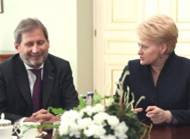
President Dalia Grybauskaitė met this week with EU Commissioner for Regional Policy, Johannes Hahn.
The meeting focused on the preparation for negotiations on the EU financial framework for the period 2014 - 2020 and the European Cohesion Policy.
According to the President, the principle of distribution of the EU aid, which has been proposed by the European Commission, does not satisfy Lithuania.
In distributing the EU aid, account should be taken of the interests and the level of development of each country, the President said. During negotiations, Lithuania will seek the review of the principles of distribution of structural aid.
- Bookmark :
- Digg
- del.icio.us
- Stumbleupon
- Redit it
Only a few kill themselves for rational reasons
- Posted by - (1) Comment

By: Dr. Boris Vytautas Bakunas, M. A., M. Ed., Ph. D.
"The vast majority of people who commit suicide are severely depressed. Only a few kill themselves for rational reasons such as avoiding the final stages of an extremely painful and fatal illness. Depression may be triggered by adverse events, but they are not the direct cause of most depressions. Many people face extreme adversity without succumbing to depression.
As a vast amount of empirical research has shown, the belief systems that people hold have a profound effect on their moods. People who suffer from depression generally believe several of the following things : (a) their lives are terrible, (b) they are guilty for having brought on the bad conditions they face, (c) they are powerless to change their lives, and (d) their lives will never improve. When you're depressed you tell yourself that a horrible tragedy has struck your life, you are worthless and overwhelmed by the difficulties you face, and since there is nothing you can do to solve your problems, your life is not worth living.
A vast body of research also shows that the most effective ways of overcoming depression help people change their underlying attitudes and improve their abilities to cope with the inevitable frustrations of life. Two extremely effective -- and closely related -- forms of psychotherapy are Rational Emotive Behavior Therapy developed by Dr. Ellis and Cognitive Behavior Therapy developed by Dr. Aaron T. Beck.
Research conducted by Dr. Forrest Scogin and his colleagues from the University of Alabama Medical Center found that two thirds of the subjects given a book by Dr. David D. Burns called "Feeling Good: The New Mood Therapy" and encouraged to read it as well as do the simple exercises described either experienced a substantial reduction in their depression or recovered entirely within four weeks, while those from whom the book was withheld failed to improve. No medications or psychotherapy were used with either of the two groups.
"Feeling Good: The New Mood Therapy" was first published in the early 1980s and is still imprint. In a survey of 1,000 mental health professionals, it was selected as the best self-help book ever written. I have benefited enormously from it myself, and I have recommended it to many others. A typical response is "This book changed my life."
Of course, anyone with suicidal thoughts had better seek professional treatment immediately. Nevertheless, bibliotherapy has been shown to be extremely helpful. Read some of the reviews of "Feeling Good" on Amazon.com. In Europe, it can be purchased from Amazon.com UK.
http://www.amazon.com/Feeling-Good-The-Mood-Therapy/dp/0380810336/ref=sr_1_1?s=books&ie=UTF8&qid=1332863886&sr=1-1"
Boris wrote: ""Rational Emotive Behavioral Therapy (REBT) methods can be beneficially directed toward addressing both irrationalities in depressive thinking but also conditions that commonly coexist with depression such as anxiety, anger, panic, and an inappropriately low tolerance for frustration. Effectively dealing with depressive thinking and these coexisting conditions can open opportunities for fulfillment as well as for preventing depression from coming back. Among the various cognitive methods for arresting depression, the REBT method would seem to be the more comprehensive approach for defeating both depressive thinking and the sort of negative thoughts that are part of those conditions of mind that so often coexist with depression.
Fascinating new brain scan research shows that applying cognitive procedures to reduce depressive thinking commonly results in measurable changes in the brain that are associated with a significantly lower relapse rate. Following the use of cognitive methods, brain wave studies show more normalized wave patterns. Following cognitive interventions, brain imaging shows a shift from the color of a depressed brain toward the color of a “normal” brain. These physical measures, coupled with reports of feeling better, make a compelling case for using cognitively oriented methods for defeating depressive thinking." Dr. Bill Knauss
http://www.rebtnetwork.org/essays/depression2.html"
Dr. Boris Vytautas Bakunas, M. A., M. Ed., Ph. D.
Chicaho, USA
- Bookmark :
- Digg
- del.icio.us
- Stumbleupon
- Redit it
- Posted by - (1) Comment
New series of articles – starting today!
Healing the wounds between LT-Americans and the homeland
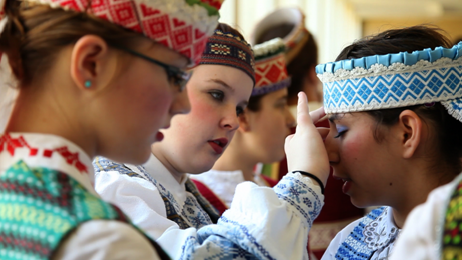
Photo: National Lithuanian American Hall of Fame
Aage Myhre, Editor-in-Chief
aage.myhre@VilNews.com
The relationship between Lithuania’s diaspora groups in the U.S. and the home country Lithuania is not always the best. Many here in Lithuania still believe that those who left, whether for economic or political reasons, had very comfortable lives compared to those who stayed behind and had to fight through several decades of inhuman oppression and abuse by the Soviet occupiers.
Many Lithuanians in the United States believe in turn that the mother country does not welcome them to return or collaborate on improving the development of the nation called Lithuania, and have been critical about ongoing corruption, that rule of law is still not working effectively, etc.
VilNews will through much of April focus on this topic, and we hereby invite all with views to prepare posts; in the form of blogs, comment articles or information you think might shed light or be of benefit to the relationship. The goal is to build bridges and contribute to reconciliation!
These are some of the challenges and opportunities we face:
1.
Lithuanian-Americans played a significant role in the post-war years, until Lithuania's recovered independence in 1990-1991, by constantly exerting pressure on the U.S. President and leaders in other Western countries so that they would pressure the Soviet Union to allow the Baltic countries freedom after the Soviet occupation that took place during World War II. Now, as more than 20 years have passed since the freedom bells rang, the question is whether the Lithuanian-Americans have a role to play also today? See our article
https://vilnews.com/?p=8899
2.
“The majority, I believe, are disappointed and discouraged with the present president’s seemingly unfriendly view toward Lithuanian-Americans and others abroad.” This said Regina Narusiene, President of the World Lithuanian
Community, in a recent interview (see https://vilnews.com/?p=6704), based on a comment referred to in The Baltic Times, where President Grybauskaite should have said that most prominent U.S. Lithuanian émigrés, instead of focusing on developing U.S. - Lithuanian business ties, prefer providing political advice to the Lithuanian authorities, which may not be that necessary nowadays. She was supposedly “disappointed by Lithuanian émigrés’ inability to attract U.S.-based investments to Lithuania.” Here in VilNews we often hear Lithuanian-Americans say they do not feel welcome to their home country, and that Lithuania's current president seems to antagonize them. What are our readers’ comments to this?
3.
In a VilNews interview Regina Narusiene told about her youth in Chicago, after she and her family had settled there after escaping from Lithuania in 1944. One of the things she said, was: “I realized that my father was afraid of informers who could make life difficult for us, for our relatives who remained in Lithuania, and for the Lithuanian partisans who kept on fighting against the Soviet occupants well into the 1950s. The KGB had their own spies within the Lithuanian communities in the U.S., so we were extremely careful with what we said outside the home." Now, when the KGB archives have been made public, are there new traces of KGB post-war activities to be found also in the U.S.?
4.
In a meeting at the Lithuanian Embassy in Washington last year, representatives of LAC (Lithuanian American Council) expressed their concern on a wide range of topics including Lithuania's developing energy policy, the country’s image in the international community, emigration issues and their demographic impact, the prospect of maintaining citizenship rights of recent immigrants, ongoing cooperation between organizations of the Diaspora and Lithuania, and minority issues in Lithuania. LAC representatives suggested that Lithuania would benefit significantly by availing itself of the expertise and knowledge found in the Diaspora communities in developing energy and security policies and a host of other areas such as environmental issues, ecology, medicine, economic development, and the promotion of improved interactions between the government and the people through non-governmental organizations (ref. https://vilnews.com/?p=5031). Has there been any official Lithuanian response to this?
5.
In November 2011, the Jewish Lithuanian Heritage Project hosted a roundtable “Think Tank” at the Lithuanian embassy in Washington. The theme of the discussion was, "A comprehensive Five Year plan to improve Lithuanian-Jewish relations: Cultivating Sunflowers." (ref. https://vilnews.com/?p=9949). In a response, one of our readers wrote: “Is this about the establishment of a new Judenrat to apologize for Lithuanian anti-Semitism? “If truth be told” having a holiday party at Lithuania’s D.C. Embassy is not revolutionary. What would be revolutionary would have been, and would be, is the prosecution of Lithuanian collaborators and SS members, the prosecution of today’s neo-Nazi youth groups, reinstatement of the ban against the display of the swastika and ending the noxious practice of the Uzgavenes holiday when people dress as Jews and beg on the street.” Harsh words?
COMMENT 1:

Rimantas Aukstuolis
“I am very pleased to see this intra-Lithuanian forum open up and give vent to these prejudices we have about each other”
I am very pleased to see this intra -Lithuanian forum open up and give vent to these prejudices we have about each other. VilNews is perhaps the best and only such place I am familiar with, with a broad enough readership to bring disparate but, hopefully responsible discussion to bear on this topic.
I am the American born son of a post WW2 DP father and a US born and raised, second generation Lithuanian mother. The DP's and old immigration Lithuanians never did mix very much and we all have a similar disconnect with the new "third wave". So it's not surprising to see a gap between the Lithuanian diaspora (of whatever immigration) and modern Lithuanian-Lithuanians.
My wife Vita and I, together with our four (at the time) young children lived in Vilnius while I worked as an adviser from the US Treasury in the early 90's. We sure did experience the cultural differences but, on balance, came away, humbled and culturally enriched by the experience.
Yes, I have seen the dark prejudice and defensive suspicion held by some native Lithuanians, some of whom would, on balance, be more comfortable in a Russian dominated, Soviet style environment than a capitalist, democratic society. I have also seen the "successful" overseas Lithuanian who, of course, knows everything better than his native cousins and isn't bashful about letting them know. I hope I wasn't one! I think each of these extremes are embarrassing for people of good will on either side of the divide, of which there are many.
We do need to reach out, however. Lithuania can benefit by the skills of the diaspora which should not be turned away as help from any quarter is needed (President Grybauskaite notwithstanding). Likewise, in spite of our active Lithuanian cultural lives in the diaspora, our Lithuanian language and ethnic identities are fading, our children assimilating. Lithuania, for all its issues is our living, modern cultural cradle.
Rimantas Aukstuolis
Cleveland, Ohio, USA
Rimantas Aukstuolis:
I was born 1952 in Omaha, Nebraska, USA. Mother (Genevieve Jesonis) was born in Omaha to old immigration (1906) parents. Father (Mecys Aukstuolis) was born in Lithuania and DP, post war immigrant. Married to Vita (Musonis), daughter of post war immigrant parents (Vytautas and Genovaite). Vita is a clinical psychologist. We have four children; Kestutis, Algirdas, Lina and Vytautas who is youngest and studying at Ohio State University.
Currently living in Cleveland Ohio area where we have spent most of our lives although Vita was born and raised in the Chicago area.
I have been an international and commercial banker since 1976 and have worked for several large regional US banks. Currently working at Fifth Third Bank in Structured Trade Finance which involves export financing. In 1993 I moved with my family to Lithuania where I worked for the US Treasury Department as an advisor to the then fledgling Bank of Lithuania. We lived in Lithuania for two and a half years.
All members of the family have been involved in Lithuanian activities all their lives and the children all speak Lithuanian. Currently I belong to the Exultate Lithuanian choir in Cleveland and Vita is active with Ateitininkai.
- Bookmark :
- Digg
- del.icio.us
- Stumbleupon
- Redit it
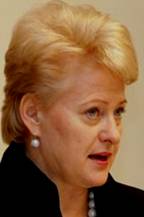 Dalia Grybauskaite, President of the Republic of Lithuania |
 Regina Narusiene, President of the World Lithuanian Community |
REGINA NARUSIENE: “The majority, I believe, are disappointed and discouraged with the present president’s seemingly unfriendly view toward Lithuanian-Americans and others abroad.”
The Baltic Times writes that Lithuanian President Grybauskaite is supposedly “disappointed by Lithuanian émigrés’ inability to attract U.S.-based investments to Lithuania.” The newspaper refers to a WikiLeaks document.
According to WikiLeaks, Grybauskaite emphasizes that most prominent U.S. Lithuanian émigrés, instead of focusing on developing U.S.- Lithuanian business ties, prefer providing political advice to the Lithuanian authorities, which may not be that necessary nowadays.
In a response to The Baltic Times, Regina Narusiene, President of the World Lithuanian Community, says that “The majority of Lithuanian-Americans are disappointed with Grybauskaite.”
“How do Lithuanian-Americans’ views generally differ on the former U.S.-much-linked President Valdas Adamkus and his successor, Dalia Grybauskaite? Which is favored?,” the newspaper asks Narusiene.
And she answers: “There are different points of view. Some favor President Adamkus, but the majority, I believe, are disappointed and discouraged with the present president’s seemingly unfriendly view toward Lithuanian Americans and others abroad.”
“There is the tendency of some Lithuanian politicians to think that “Lithuania belongs to the Lithuanians.” By that they mean those living in Lithuania only. The people of Lithuania have a more favorable view of Lithuanians living abroad.”
“The Lithuanians abroad have brought many investments to Lithuania. However, I want to emphasize, Lithuania has been having a difficult time setting an investment climate competitive with other countries.”
“Collaboration can have different meanings. Our private ties with the country after independence never diminished, but, in fact, intensified. Economic ties are different. A great deal of money is sent to Lithuania by Lithuanians abroad, especially to their family and friends. I believe an amount equal to about 20 percent of Lithuania’s annual national budget. Some firms have located in Lithuania, but Lithuania has to maintain an inviting environment for investment, which they are developing. Cultural collaboration, however, I admit, has been weak. There is a Lithuanian opera in Chicago that has been collaborating with the Lithuanian National Opera and Ballet Theater. We have participated in the Dance Festivals in Lithuania and sent works of art to Lithuania. Some of the entertainers from Lithuania have come to us to entertain, but working out joint programs has been difficult.”
“Can you think of any cases when Lithuanian émigrés cut off their ties with the Motherland because of the lack of the political will to adopt a dual-citizenship law?,” Baltic Times asks.
“There are a number of new émigrés who have simply said, “I can do better and live more securely abroad. If they do not want us, then why bother.” Unfortunately, these are well educated young people that Lithuania cannot afford to lose. In several instances, the taking away of Lithuanian citizenship has forced some to keep foreign citizenship so as not to lose their means of support, their pension.”
Ref: http://www.baltictimes.com/news/articles/28875/
* * *
Aroundhalf of allLithuaniansin the worldlive outsidetheir home country. They represent a humanresourceLithuaniadesperately needstoget the country back on its feet again after 50 years of bloody wars, genocides,deportations, Soviet oppressionand now two decadeswithmuchmuddle and confusion instead of professional focuson collaboration and team work amongitsown populations here and abroad.
I suggestthat thepresidentreaches outandinvitesallLithuanians,and friends of this countryaround theworld,toa close and constructive cooperation.A continued conflictis truly meaningless and devastating.
Aage Myhre, Editor-in-Chief
Lithuania would benefit significantly by availing
itself of the expertise and knowledge found
in the Diaspora communities…
- Bookmark :
- Digg
- del.icio.us
- Stumbleupon
- Redit it
Security centre will be established in Lithuania to combat nuclear smuggling
- Posted by - (0) Comment
![]()

At the Nuclear Security Summit held to address measures and initiatives for enhancing nuclear security, President Dalia Grybauskaitė introduced Lithuania’s practical contribution to combating nuclear smuggling, a centre of excellence for nuclear security.
At a Nuclear Security Summit held to address the measures and initiatives for enhancing nuclear security, President Dalia Grybauskaitė introduced Lithuania’s practical contribution to combating nuclear smuggling
Following and supporting the US initiative to create a network of centers of excellence for nuclear security, this year such center will be established in Lithuania. In cooperation with the United States and other partners, the Center of Excellence for Nuclear Security, to be set up at the Border Guard School in Medininkai, will provide training sessions, prepare exercises and interaction plans for combating nuclear smuggling, and promote interinstitutional contacts. This center is expected to become regional.
“Lithuania as a nuclear state which plans the construction of a new NPP and has spent fuel storage facilities perfectly understands the importance of securing nuclear materials from terrorists. Therefore, Lithuania will continue to contribute to the efforts of international community to ensure safe use of nuclear materials,” the President underlined.
Yukiya Amano, the Director General of the International Atomic Energy Agency (IAEA), during his meeting with the President officially promised his support in constructing and developing the Nuclear Security Center of Excellence in Lithuania. According to the President, it is an important sign of international confidence in Lithuania.
- Bookmark :
- Digg
- del.icio.us
- Stumbleupon
- Redit it
Pianist Agnė Radzevičiūtė of Vilnius to be a contestant at the Sixth New York International Piano Competition
- Posted by - (0) Comment
![]()

Agnė Radzevičiūtė
Photo: Tayla Nebesky
22 Young Pianists, Ages 16-21 Have Been Chosen From Across the Globe for Week-long Event at The Manhattan School of Music.
The Stecher and Horowitz Foundation of New York has announced the contestants who will compete at the Sixth New York International Piano Competition, which will be held at The Manhattan School of Music from Monday, June 18 through Friday, June 22, 2012.
Twenty-two pianists, ages 16-21, will gather from across the globe for the week-long event, which includes four rounds plus a series of masterclasses and seminars. Awards are also given to the best duo, paired at the beginning of the competition, to perform in the ensemble round.
Unique to the New York International Piano Competition is its policy of no elimination; each contestant will perform in all four rounds and be judged by a jury of some of the most distinguished members of the music community. Every participant will return home either as a prize winner or finalist award recipient. The level of competition has been uniformly high over the event’s 10 year history; former winners have gone on to win the Gilmore Young Artist Award, The Juilliard School’s William Petschek Recital Award, the Louis Sudler Prize in the Arts at Harvard University, the Young Concert Artists International Auditions, the 2010 Concert Artists Guild Victor Elmaleh Competition, and some to become National Foundation for Advancement in the Arts Presidential Scholars.
- Bookmark :
- Digg
- del.icio.us
- Stumbleupon
- Redit it
- Posted by - (0) Comment
“Our ancestors always whisper in our ears, they beg to be understood”
 |
Last week we brought an article with the latest statistics from the World Health Organization, showing that Lithuania again is on top when it comes to suicides – with 61,3 men and 10,4 women per 100,000 inhabitants deciding to end their lives this sad way – annually.
Dainius Puras, a Lithuanian psychiatrist, explains how it is the uncertainty and unpredictability of the economic situation that have such a detrimental effect: "People don't like change,” he says, referring to Lithuania’s 20-year period of dramatic social and economic change since the fall of the Soviet Union in 1991”. |
Response from Vijole Arbas in Kaunas:
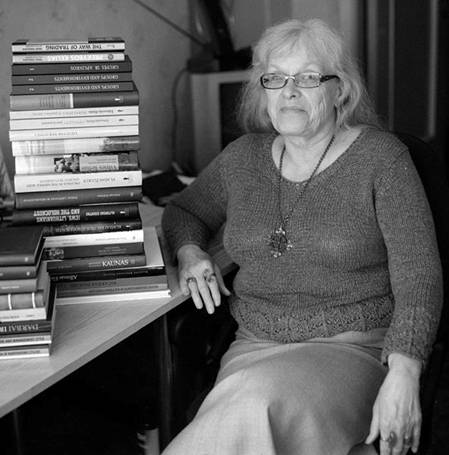
This cannot be the only explanation -- we are plagued by bad spirits of our past, we can't seem to "clean up", to make amends.
Jūratė Sučylaitė wrote a novel (can't recall the exact title Pokalbis su Ragana, somthing like that). Her thesis (if I may call it that) is that our ancestors always whisper in our ears. They beg to be understood. That does not mean to glorify but understand, realize why, forgive, make amends. People want to drown out those voices of the dead by alcoholism, suicide. It is a haunting story that rings very true to me.
On the other hand, the ancestors of American Lithuanians also whisper, also had the sins of betrayal against one's fellow man as well as of victimization. Why don't they hear those ghosts?
A film by V. Landsbergis Jr., When I Was a Partisan, also deals with this sort of concept.
 |
Irene Simanavicius: There is so much more to this...so much more. Those of us that grew up in North America and have visited Lithuania got to know and love people we have met during our visits. People young and old shared some of the stories that were heart wrenching. I agree with Vijole Arbas 100 %. |
- Bookmark :
- Digg
- del.icio.us
- Stumbleupon
- Redit it
- Posted by - (2) Comment
“Our ancestors always whisper in our ears, they beg to be understood”
 |
Last week we brought an article with the latest statistics from the World Health Organization, showing that Lithuania again is on top when it comes to suicides – with 61,3 men and 10,4 women per 100,000 inhabitants deciding to end their lives this sad way – annually.
Dainius Puras, a Lithuanian psychiatrist, explains how it is the uncertainty and unpredictability of the economic situation that have such a detrimental effect: "People don't like change,” he says, referring to Lithuania’s 20-year period of dramatic social and economic change since the fall of the Soviet Union in 1991”. |
Response from Vijole Arbas in Kaunas:

This cannot be the only explanation -- we are plagued by bad spirits of our past, we can't seem to "clean up", to make amends.
Jūratė Sučylaitė wrote a novel (can't recall the exact title Pokalbis su Ragana, somthing like that). Her thesis (if I may call it that) is that our ancestors always whisper in our ears. They beg to be understood. That does not mean to glorify but understand, realize why, forgive, make amends. People want to drown out those voices of the dead by alcoholism, suicide. It is a haunting story that rings very true to me.
On the other hand, the ancestors of American Lithuanians also whisper, also had the sins of betrayal against one's fellow man as well as of victimization. Why don't they hear those ghosts?
A film by V. Landsbergis Jr., When I Was a Partisan, also deals with this sort of concept.
 |
Irene Simanavicius: There is so much more to this...so much more. Those of us that grew up in North America and have visited Lithuania got to know and love people we have met during our visits. People young and old shared some of the stories that were heart wrenching. I agree with Vijole Arbas 100 %. |
- Bookmark :
- Digg
- del.icio.us
- Stumbleupon
- Redit it
Eurozone problems do not leave anybody cold
- Posted by - (0) Comment
![]()

Rūta Vainienė
A survey of the Lithuanian economy conducted by the Lithuanian Free Market Institute (LFMI) shows that eurozone problems do not leave anybody cold. Lithuania failed to join the eurozone in 2007 because it missed the inflation criteria by only 0.06 per cent. At the time, it was considered a big political failure. However, given the present vulnerability of the eurozone, it may look like a windfall success. The national currency, the litas, is pegged to the euro under currency board arrangement, so the litas remains very closely linked to the euro.
- Bookmark :
- Digg
- del.icio.us
- Stumbleupon
- Redit it
New campus initiative – LCC International University in Klaipeda opens an Institute for Innovation Design.
- Posted by - (0) Comment
![]()

Eglė Songailienė and Vaidas Levickis, members of the Business Administration Faculty at LCC in Klaipeda.
LCC International University in Klaipeda has welcomed a new initiative on campus - the Institute for Innovation Design. The idea to launch this new project, which will contribute in transforming challenges into opportunities, was developed by Eglė Songailienė and Vaidas Levickis, members of Business Administration faculty.
The Institute will have a group of professional qualitative researchers, who will bring unique skills and competences to the project. Key activities of the Institute will include various researches and projects. The Institute will work with various organizations to help them better understand the needs and experiences of the people they serve and create innovative solutions.
The Institute will host 12 monthly sessions for leaders about the best innovation practices, the latest breakthrough ideas and transformative intellectual conversations in literature. It will also offer a summer internship program, which will provide students with unique hands-on work experience, in collaboration with faculty members.
The Institute for Innovation Design will not only work to help organizations better connect with the people they serve and design customer experiences with great value to business, but also offer new, creative initiatives for LCC students.
- Bookmark :
- Digg
- del.icio.us
- Stumbleupon
- Redit it
Happy Stork Day!!
- Posted by - (1) Comment
|
The white stork (gandras) is usually felt to be the national bird of Lithuania. Lithuanians believe that storks bring harmony to the families on whose property they nest; they have also kept up the tradition of telling their children that storks bring babies. Stork Day is celebrated on 25 March with various archaic rituals: gifts for children, attributed to the storks, such as fruits, chocolates, pencils, and dyed eggs, which are hung on tree branches and fences; snakes are caught, killed and buried under the doorstep; straw fires are lit. Notably, Lithuania is a beneficial and important habitat for these birds: it has the highest known nesting density in the world! |
 |
- Bookmark :
- Digg
- del.icio.us
- Stumbleupon
- Redit it
VilNews e-magazine is published in Vilnius, Lithuania. Editor-in-Chief: Mr. Aage Myhre. Inquires to the editors: editor@VilNews.com.
Code of Ethics: See Section 2 – about VilNews. VilNews is not responsible for content on external links/web pages.
HOW TO ADVERTISE IN VILNEWS.
All content is copyrighted © 2011. UAB ‘VilNews’.

 Click on the buttons to open and read each of VilNews' 18 sub-sections
Click on the buttons to open and read each of VilNews' 18 sub-sections 


















.jpg)



